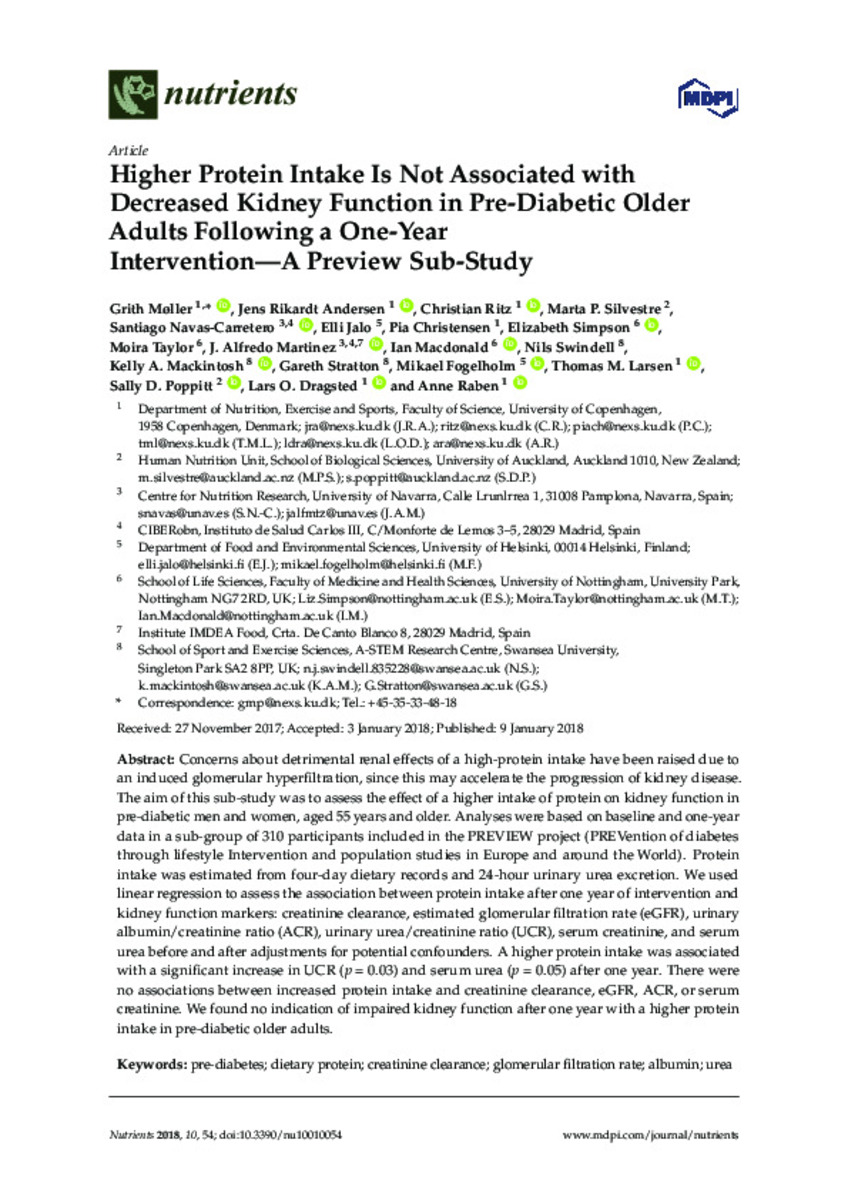Full metadata record
| DC Field | Value | Language |
|---|---|---|
| dc.creator | Møller, G. (Grith) | - |
| dc.creator | Andersen, J.R. (Jens Rikardt) | - |
| dc.creator | Ritz, C. (Christian) | - |
| dc.creator | Silvestre, M.P. (Marta P.) | - |
| dc.creator | Navas-Carretero, S. (Santiago) | - |
| dc.creator | Jalo, E. (Elli) | - |
| dc.creator | Christensen, P. (Pia) | - |
| dc.creator | Simpson, E. (Elizabeth) | - |
| dc.creator | Taylor, M. (Moira) | - |
| dc.creator | Martinez, J.A. (José Alfredo) | - |
| dc.creator | MacDonald, I. (Ian) | - |
| dc.creator | Swindell, N. (Nils) | - |
| dc.creator | Mackintosh, K.A. (Kelly A.) | - |
| dc.creator | Stratton, G. (Gareth) | - |
| dc.creator | Fogelholm, M. (Mikael) | - |
| dc.creator | Larsen, T.M. (Thomas M.) | - |
| dc.creator | Poppitt, S.D. (Sally D.) | - |
| dc.creator | Dragsted, L.O. (Lars O.) | - |
| dc.creator | Raben, A. (Anne) | - |
| dc.date.accessioned | 2023-02-27T08:40:19Z | - |
| dc.date.available | 2023-02-27T08:40:19Z | - |
| dc.date.issued | 2018 | - |
| dc.identifier.citation | Møller, G. (Grith); Andersen, J.R. (Jens Rikardt); Ritz, C. (Christian); et al. "Higher protein intake is not associated with decreased kidney function in pre-diabetic older adults following a one-year intervention-a preview sub-study". Nutrients. 10 (1), 2018, 54 | es_ES |
| dc.identifier.issn | 2072-6643 | - |
| dc.identifier.uri | https://hdl.handle.net/10171/65562 | - |
| dc.description.abstract | Concerns about detrimental renal effects of a high-protein intake have been raised due to an induced glomerular hyperfiltration, since this may accelerate the progression of kidney disease. The aim of this sub-study was to assess the effect of a higher intake of protein on kidney function in pre-diabetic men and women, aged 55 years and older. Analyses were based on baseline and one-year data in a sub-group of 310 participants included in the PREVIEW project (PREVention of diabetes through lifestyle Intervention and population studies in Europe and around the World). Protein intake was estimated from four-day dietary records and 24-hour urinary urea excretion. We used linear regression to assess the association between protein intake after one year of intervention and kidney function markers: creatinine clearance, estimated glomerular filtration rate (eGFR), urinary albumin/creatinine ratio (ACR), urinary urea/creatinine ratio (UCR), serum creatinine, and serum urea before and after adjustments for potential confounders. A higher protein intake was associated with a significant increase in UCR (p = 0.03) and serum urea (p = 0.05) after one year. There were no associations between increased protein intake and creatinine clearance, eGFR, ACR, or serum creatinine. We found no indication of impaired kidney function after one year with a higher protein intake in pre-diabetic older adults. | es_ES |
| dc.description.sponsorship | The study was funded by EU FP7, (#12057), the Danish Technological Institute, the Danish Agriculture & Food Council, and the New Zealand Health Research Council, grant No. 14/191. All LED products were provided for free by Cambridge Weight Plan®, UK. | es_ES |
| dc.language.iso | eng | es_ES |
| dc.publisher | MDPI | es_ES |
| dc.rights | info:eu-repo/semantics/openAccess | es_ES |
| dc.subject | Pre-diabetes | es_ES |
| dc.subject | Dietary protein | es_ES |
| dc.subject | Creatinine clearance | es_ES |
| dc.subject | Glomerular filtration rate | es_ES |
| dc.subject | Albumin | es_ES |
| dc.subject | Urea | es_ES |
| dc.title | Higher protein intake is not associated with decreased kidney function in pre-diabetic older adults following a one-year intervention-a preview sub-study | es_ES |
| dc.type | info:eu-repo/semantics/article | es_ES |
| dc.description.note | This article is an open access article distributed under the terms and conditions of the Creative Commons Attribution (CC BY) license (http://creativecommons.org/licenses/by/4.0/). | es_ES |
| dc.identifier.doi | 10.3390/nu10010054 | - |
| dadun.citation.number | 1 | es_ES |
| dadun.citation.publicationName | Nutrients | es_ES |
| dadun.citation.startingPage | 54 | es_ES |
| dadun.citation.volume | 10 | es_ES |
| dc.identifier.pmid | 29315212 | - |
Files in This Item:
Statistics and impact
Items in Dadun are protected by copyright, with all rights reserved, unless otherwise indicated.






